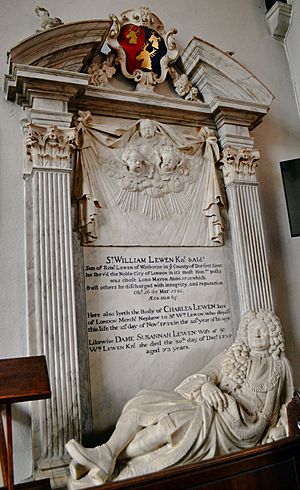William Lewen facts for kids
Sir William Lewen (born around 1657 – died 1722) was an important British merchant and politician. He lived in Ewell, Surrey. He was a member of the House of Commons, which is part of the British Parliament, from 1708 to 1722. He also served as the Lord Mayor of London in 1717.
Early Life
William Lewen was born around 1657. His family was from Wimborne Minster in Dorset, England. His older brother, George, became a merchant in Poole. William, however, moved to London. There, he started a business importing wine.
He was also a member of the Haberdashers Company. This was a group for merchants who sold small items like ribbons and needles. On July 30, 1685, he married Susannah Taylor. Her father was a vintner, which means he sold wine.
His Career in Business and Politics
By 1696, William Lewen was a leader in the Royal Lustring Company. This company made a special type of shiny silk. In 1698, the company received a special permission from the King. However, the company's business slowed down as fashion changed.
Lewen also became involved in city government. From 1700 to 1703, he was a Common Councillor for Billingsgate, a part of London. By 1706, he was living in Ewell and later bought land there. In 1708, he was elected as an Alderman for Castle Baynard. An Alderman is a senior member of a city council. He held this role for the rest of his life.
In the same year, 1708, he was elected as a Member of Parliament (MP) for Poole. His brother was the mayor of Poole at the time. In 1709, he became the Master of the Haberdashers Company.
Lewen was re-elected as an MP for Poole in 1711. From 1711 to 1714, he was a Colonel in the Blue Regiment of the City Militia. This was a local army group. He also served as Sheriff of London from 1712 to 1713. A Sheriff was an important official in the city. He was given the title of "Sir" on December 17, 1712, which means he was knighted.
In Parliament, he voted against a bill about trade with France in 1713. He was re-elected as a Tory MP for Poole without anyone opposing him in the elections of 1713 and 1715.
Death and Legacy
Sir William Lewen passed away on March 16, 1722. This was shortly after Parliament had finished its session. He was buried at St Mary's Church in Ewell. He did not have any children. His nephew, George Lewen, inherited his property. His wife, Susannah, died later in 1737.
 | Roy Wilkins |
 | John Lewis |
 | Linda Carol Brown |


